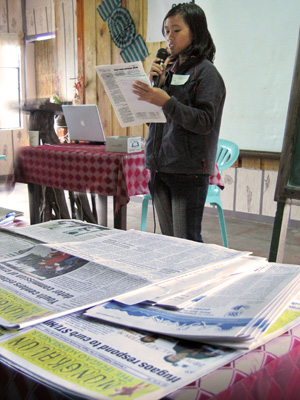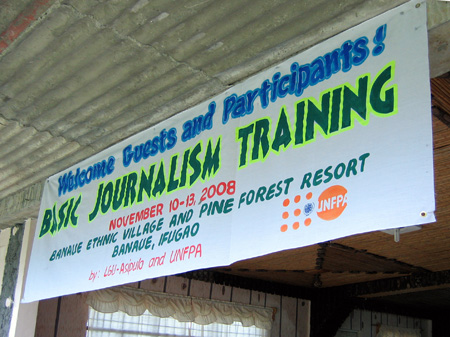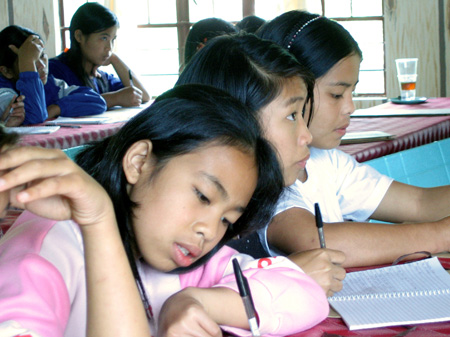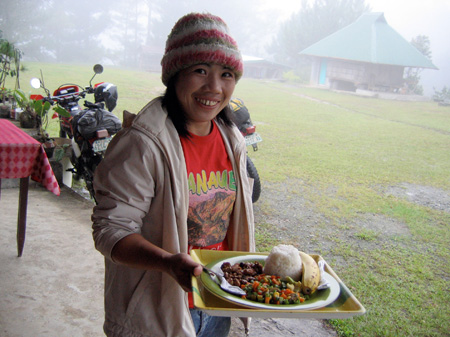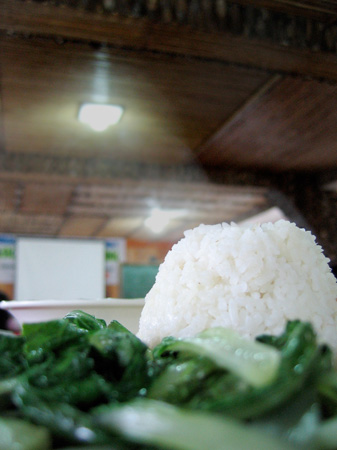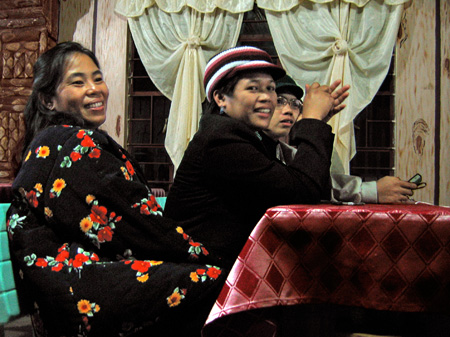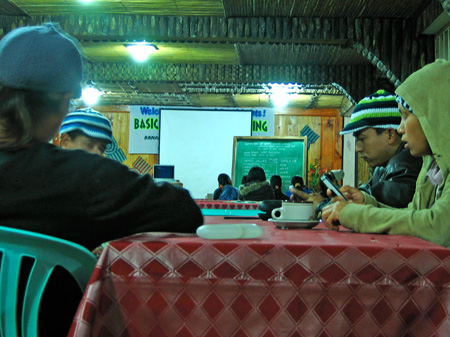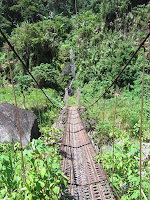GJ dela Rosa

On April 8, 2008, GJ dela Rosa's fragile, physical shell gave up and succumbed to the call of angels in a hospital in Pasadena following a tragic accident, being critically hit by a car hours after he and his family arrived in America.
Like most Filipino children who dream of experiencing Disneyland in America first-hand, seeing their favorite super hero characters up-close, and sight-seeing with relatives, GJ's first USA trip came as a gift and a surprise reward from his parents for finishing 1st Grade.
GJ's case was brought to my attention by his uncle, a member of my Mac forum where he
posted a thread requesting for prayers for GJ and his parents' recovery. GJ's dad was also seriously injured; his mom seems to be in a better condition to recover. Another unidentified pedestrian was also a victim.
There was ample coverage on the tragic accident at the corner of a busy Old Pasadena district, but of all the linked media coverage I read and watched, it was this
local ABC News coverage that told most of the story.
I do not know GJ personally, except for the forum post and wishes of recovery and condolences as when I replied to his uncle's thread. The thread had reached nine pages in a short span of time and spawned an outpouring of sympathies and prayers. Subsequently, I discovered that the closest possible connection I have with this little boy is from a similar request for prayers and financial help when I received an email from my high school alumni
YahooGroup: it seems GJ's dad and relatives are alumni of my high school.*
It is always a tragic event to lose a child because we hope for better prospects for the young. That is what forebears mould their children to be: productive, accomplished, caring. Parents give much of themselves so that their children will have a life ahead of them and carry on what they have learned and become better individuals than their forebears.
GJ, 8 years old, was cremated in America while his parents are still recovering. If you can spare something to help GJ's folks defray the cost of hospitalization and recovery, please go to
GJ's World. There, you will know more about GJ's story and be able to leave words of comfort to his bereaved family.
..................
April 15 | *I recently found out that the family were old-time residents of the same street in San Juan where we used to live.
Julia

A year ago this month, on April 7, US Peace Corps volunteer
Julia Campbell made a personal wish come true by spending her remaining R&R to visit the famed Rice Terraces of Banaue in Ifugao. Julia had read much about these natural wonders and allotted time and resources to personally experience the mountain phenomena.
Julia was at the peak of her active life. At 40 and an accomplished journalist, she chose to give two years of her life to helping the marginalized community members of Calamba, Laguna and Donsol, Sorsogon by becoming a volunteer teacher, solicitor of books for a local library, and ecology advocate.
Julia would have ended her 2-year tenure in the Philippines in June of 2007 and pursue further studies at the NYU in New York where she had been based prior to her appointment to the Philippines.
Julia, it seems, was
not the typical American visitor. She had planned, among others, to set up a Tagalog-language group with fellow volunteers in the US, and, further, planned a return journey to the Philippines and Southeast Asia. Julia learned Tagalog in the US before coming here. She not only had a good command of Tagalog, but later learned and could converse in Bicolano as well, even learning how to prepare and cook Bicolano food, especially
ginataan (food cooked in coconut milk).
Julia knew which of the Banaue terraces had the best vista and therefore took the route to Batad district. On the afternoon of her scheduled trek to Batad, she failed to contact friends and acquaintances whom she was with the night before. Not long after, she was reported missing by her Peace Corps family. After a few days, the unfortunate news of her brutal death stunned all of those who knew her and who kept vigil. It was later found out that a native guide, a non-Ifugao,
had admitted to the killing. Her community members and adoptive families in Laguna and Sorsogon, US Peace Corp friends in the Philippines, and family members in the US were left to grieve for the loss of a caring and gracious loved one.
Julia's mother and friends were
recently in Banaue, Ifugao to attend the second and last hearing of Julia's case. Juan Dontogan (or Duntugan) has confessed to and apologized for the crime, her case in court has ended and
verdict will be out on June 30.
Julia's passing would have remained a low-key event. Like soldiers, their lives as volunteers were prepared for dangerous undertakings. However, Julia's death was a most unlikely circumstance. Ifugao, and Banaue in particular, had not had a record of crime of this nature considering the number of tourists, foreign and local, that the place
receives annually. It is unfortunate that Julia's death seems to be the assonant contrapunto to the magnificent beauty of Banaue.
On June 2007, a symbolic peace offering by the Ifugao people, probably one of the most beneficent and peace-loving tribes of the Philippines — through another USPC volunteer of a younger batch, the energetic Dustin Butler — inaugurated the
Julia Campbell Agroforest Memorial Park (JCAMPark) in Asipulo, Ifugao. Asipulo is historical, as is the whole of Ifugao Province. Asipulo's mountains are silent witnesses to the American and Japanese casualties of World War II. Today, the elder men and women of Asipulo still have stories to tell about the 'Million Dollar Hill', Yamashita's retreating troops and about the displaced mountain boulders scattered on the rice fields as a result of dynamite blasts.
Asipulo, where Dustin is assigned as a farming volunteer, is about 45 minutes south of Banaue, yet the distance is by no means a hindrance to the gratefulness of the Ifugao people in wishing to commemorate what Julia lived for: peace, love for others, care for the environment, and the initiative to reach out and understand one's fellow man.
The
JCAMPark may yet be a fine example of an interstice between giving (of oneself) and the premature end of (the ability to give); a living offering of peace.
Grandma

Two years ago today, Grandma passed on from this physical plane to the immortal and peaceful.
That Grandma lived a full life is an understatement. She passed the century mark and outlived some of her children and almost all of her contemporaries: fellow war veterans, co-teachers and students. She lived long enough to see great-great-
great grandchildren born to this world. She knew our birthdays and milestones by heart, whose child, spouse or in-law is who's, at whose house or venue an occasion was happening, and why.
Grandma was a widow throughout the post-war years, bringing up seven children, putting them to school, feeding each throughout college and still had energy and compassion to spare when the grandchildren — my generation — needed to be taken care of.
In her living years, Grandma was wife, mother, sister, teacher, guardian, grandmother, barrio head and counsel, financier, adviser and provider all in one. Her memory is unmatched, her experiences deep and vast.
Grandma was a petite woman, yet she cast a long and dominant shadow. In her 80s, she beat up a poor garden snake with her cane after it made the mistake of springing an early morning surprise on my mother out in the yard in Fairview. In as much as Grandma did not spare the snake, so too was my mother not spared from her scolding. In her 90s, she complained about her failing eyesight and requested to see an eye doctor. By her mid-90s, she was adamant at letting her grade school great-grand kids know the difference between sucrose and fructose. When I stayed with her to continue my elementary studies, she taught me the "right way" to pronounce
monocotyledon and
dicotyledon as had been taught her by the Thomasites, completely different from how we were taught by the local teachers.
That Grandma was old school is another understatement. I, with other female cousins (if there were any for company), were forbidden to play in the afternoons with the boys or spend leisure time simply looking out the windows. Instead, she would say, insistently:
the woman's place is in the kitchen. She tolerated the naughtiness of the boys, yet provided them the shoulder to cry on when their (adult) lives seemed headed for the rocks.
Grandma was well versed with current events. She was so old-school, in fact, that she opined Monica Lewinsky was as much at fault (that's short of blaming her), and Bill Clinton too weak to resist seduction. I was told that she, like many Filipinos of her generation, cried when JFK was shot, followed man's landing on the moon on the radio, and, when finally bedridden, did not request for a cellphone — no! — but politely demanded to have one so she could reach people when she needed to, "just like the
kakadwa (household help) who had nothing else better to do than text their friends in between work". Grandma, therefore, actually owned a cellphone, courtesy of a cousin, sometime before she succumbed three months short of 104.
When Grandma passed on, practically the whole province came to bid her goodbye. Relatives who have settled in all the three major Philippine islands and the Americas came to pay their last respects. The whole event was overwhelming and totally unexpected.
On the day that we walked Grandma's mortal remains for interment, the line was incredibly long, starting from were she lay in state in my uncle's barrio house west of town, to the
church passing the National highway, then southward to the town cemetery where we occupied half the narrow Maharlika Highway holding up traffic both ways for minutes. My sister would not miss this occasion for the world, meeting up with the entourage that was coming out of the last rites from church after she alighted from the bus, her trip the equivalent of the red-eye straight from lighting an Earth Day event in Manila the night before.
I saw Grandma's life in the nameless faces who walked with us that day or who came to say goodbye: old women and men in black, local folks who, when she was alive, dropped by for one reason or other at her big house along the highway; relatives and descendants of her students and friends, my relatives' friends and extended family; relatives from other provinces, and countless nieces, nephews and grandchildren — my generation's grandchildren, that is. And the last of the living World War II fellow veterans of Grandma, the unknown war survivors and defenders of the State who fought alongside the Americans, passing on clandestine messages at the risk of life and limb: they draped the Philippine flag over Grandma's coffin, said a prayer in silence and gave a fitting salute. Two years ago today.

So goes the story of three lives who, in one way or other, intersected at a common platform: a young, wide-eyed boy in the land of plenty, an American volunteer in a former colony, and my Grandma, a product and disciple of the American educational system who, despite her acquired privilege of a life in America as a war vet, chose to remain in Sto. Domingo, Ilocos Sur, to serve her town mates and be our guiding light. At peace they are all now. My heart knows.
Photo credits: GJ composite: 1, 2 | Julia composite jccinnyc | Grandma composite (c) kvilla.08
